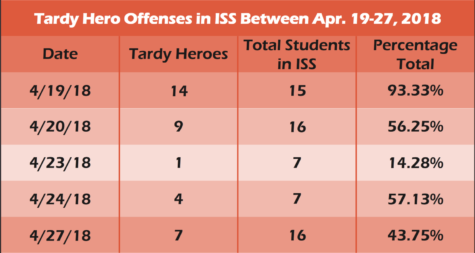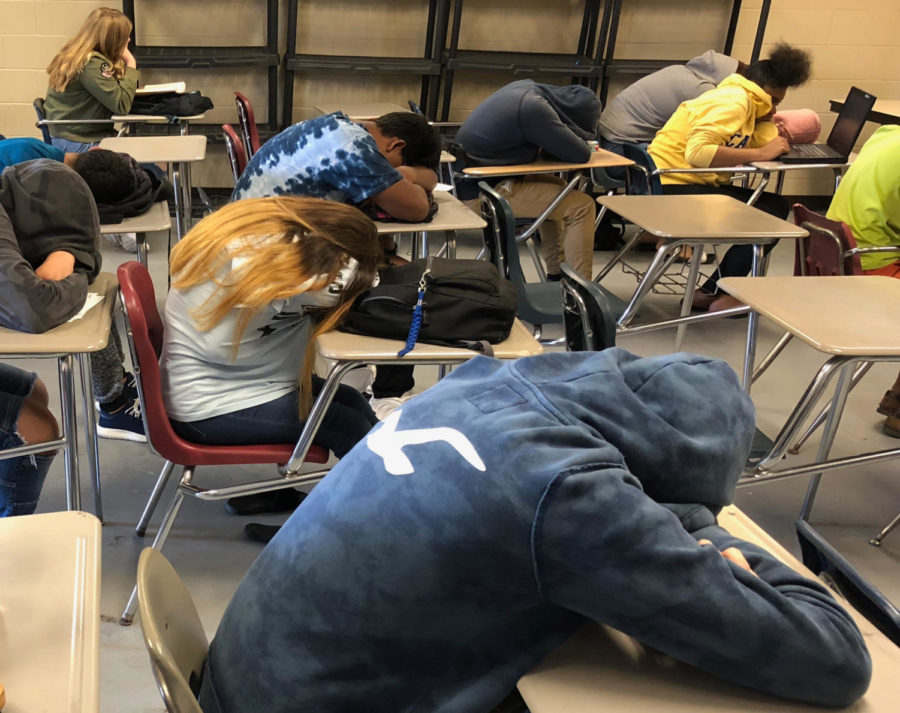THE HIDDEN COST OF SUSPENSION: PART 1
Part 1: A Suspension of Disbelief
Students in In-School Suspension (ISS) are expected to work independently on their assignments.
April 30, 2018
Note: Student names have been changed for privacy.
Ashley was the kind of teen who normally didn’t crack under pressure.
After all, the freshman had grown up with five siblings— three brothers and two sisters, to be exact— in a single-parent household headed by her mom, a former fitness trainer. She’d learned to thrive in the chaos, juggling five siblings with her schoolwork and dreams of rising out of poverty. Ashley has never lived in a “stable household,” but this never stopped her from gaining the respect of her gym teacher, Coach Millen. Since Ashley is athletic, encouraging, and a quick learner— traits she attributes to her mother’s influence— Coach Millen usually teaches her the exercises beforehand, so that she can help her classmates.
Last Thursday, however, Ashley wasn’t in the gymnasium, turning cartwheels and motivating her peers. She was sitting in a bare and windowless room behind the cafeteria serving her In-School Suspension (ISS). Her offense? Being tardy to school.
Technically, Ashley is considered a multiple-time offender. She was late to school at least eight times in the past semester, which landed her in Saturday School. Unfortunately, Ashley couldn’t make it to Saturday School— her mom works full time, and she has to take care of her siblings— so when she returned to school, she was given a notice for ISS.
Ashley does not deny that she was repeatedly tardy, but she disagrees with the punishment of being isolated from class.
“I feel like [for] fighting you should get suspended,” said Ashley. “But not for Tardy Hero, because that does nothing for you.”
Stories like Ashley’s are not uncommon across Seminole High School, leading The Seminole to investigate the hidden costs of suspension in students’ lives.
Suspension is a daily occurrence at SHS; it’s used to punish offenses that range from “aggression” to “insubordination.” While data is not yet available for the current 2017-18 school year, SHS’s official Suspension Profile (a public record) for the 2016-17 school year recorded 1269 total suspensions. For context, SHS had upwards of 3,000 students last year.
Sylvester Wynn, the dean of students who handles suspension, told The Seminole that suspension is intended to prevent zero-tolerance offenses, in addition to “defian[ce]” and “repeated misconduct.”
“Kids [are] being removed from class for disrupting others from learning,” said Dean Wynn. “School is an institution for learning, not fighting or drugs or weapons. ISS is a prevention … and intervention.”
While suspensions have been prescribed for violent offenses, such as arson or assault, the leading causes of suspension last year were less destructive offenses. These included failure to report to detention— accounting for 28.9 percent of recorded suspensions— followed by skipping and disrupting class, which accounted for 10.9 percent and 8.7 percent, respectively.
Interestingly, tardiness has recently emerged as a major cause of suspension. Since the 2017-18 Suspension Profile is not yet available to the public, tardiness cannot be conclusively designated as the leading cause of suspension. However, The Seminole independently collected data by surveying ISS students five times over eight days in April. The results, published below, demonstrate that on average, 57 percent of ISS students are serving time for tardiness.

It should be noted that this data was collected for five days, and therefore should not be taken to perfectly reflect suspension trends across the year. However, due to the implementation of Tardy Hero this year, these statistics correlate with the expectation of increased punishment for tardiness.
The rise in Tardy Hero-related suspensions has led some to question the effectiveness of punishing students for missing class by requiring them to miss more class.
“With Tardy Hero, being in ISS is really a 50-50,” said ISS supervisor Kerry Wiggins. “In one respect, it is good because you get the kid to cut down on being tardy. But it’s negative because if a child’s parent has to take them to school and they’re always stuck in traffic, they are going to get written up every day.”
For their part, the school administration maintains that ISS is a necessary and proportionate consequence for repeated tardiness. Administrative Manager Shelly Prom emphasized that ISS is only assigned after several intermediate steps have been taken. These include two warnings, one lunch detention, two Wednesday Schools, parental contact, and Saturday School.
Many students in ISS, including Ashley, are being punished for missing Saturday School, often for reasons out of their control. However, the administration says that there are policies in place to accommodate students’ personal situations. If students approach them in advance, they are often willing to reschedule the punishment. Therefore, the administration supports its use of suspension.
“You’re not getting an ISS for one tardy. It’s repeated misconduct. You could even say it’s insubordination if you miss a Saturday School and go into ISS,” said Ms. Prom. “You didn’t do what you were supposed to. We’re not comparing one tardy, we’re comparing multiple.”
The controversy of suspension, therefore, may represent a potential divide in opinion between students and staff. This divide is exacerbated by racial disparities, as will be explored in the next installment.
This story is the first in The Seminole’s ongoing series “The Hidden Cost of Suspension.” The next installment, entitled “Disparities in Suspension Rates,” will be released later this month. Zyva Sheikh and Serra Sowers contributed to this piece.

















